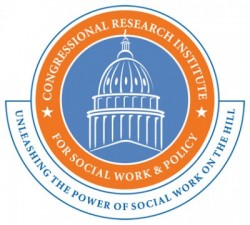The National Association of Social Workers (NASW) is celebrating its 60th anniversary and charting a course for the next sixty years. About 150 “thought leaders” were brought together in a forum Friday to assess progress made by the social work profession and to explore challenges that lie ahead for society at large and the roles social workers and NASW will play in meeting those challenges. Much of NASW’s work focuses on strengthening the social work profession’s ability to provide effective evidence-based interventions and services that help individuals, families, and organizations maximize their potential. Most recently, NASW worked with Congressional social workers to introduce the Improving Access to Mental Health Act which will expand social workers’ ability to provide services under Medicare. Senators Barbara Mikulski (MD) and Debbie Stabenow (MI), along with Congresswoman Barbara Lee (D-CA-13) introduce related bills in the Senate (S. 2173) and House (H.R. 3712).
Some of the challenges facing society and social workers were presented during the first of three panels titled: Family Well-Being Across the Lifespan. University of Maryland School of Social Work Dean Rick Barth, founder and president of the American Academy of Social Work and Social Welfare, presented the AASWSW’s 12 Grand Challenges for Social Work that include ending racial injustice, reversing extreme inequality, ending homelessness and stopping family violence among others. These are seemingly insurmountable tasks but definitely deserve the attention and full effort of social workers. The other panels were titled: Equity and Liberty in the 21st Century and Code of Ethics: Evolution and Emerging Issues. Each of the panels included many premier social work scholars and experts.
Remarks by NASW President Darrell Wheeler and Chief Executive Officer Angelo McClain underscored the need for social work to make adjustments for a rapidly evolving society, particularly one that is being reconfigured in many ways by technological advances. The ability of the profession to harness technology in service of humanity is critical to our success in meeting ensuing challenges. A prevailing theme among panelists and discussants was the need to downplay the distinction between micro and macro social work. Panel moderator Gary Bailey, professor of practice at Simmons College and past president of NASW, probably said it best when he described micro practice operating within macro practice.
 Afternoon activities were devoted to what Dr. McClain described as a “world café.” Attendees self-selected themselves into groups focusing on five topics: NASW Code of Ethics, Cultural Competence, Evidence-based Practice, Grand Challenges, and Public Policy. In each of three rounds, we were charged to produce goals to advance specific initiatives within those categories, tactics, and to identify relevant stakeholders. Participants were allowed to choose different topics in each of the three rounds. Ideas emanating from these sessions will be analyzed and presented in a white paper.
Afternoon activities were devoted to what Dr. McClain described as a “world café.” Attendees self-selected themselves into groups focusing on five topics: NASW Code of Ethics, Cultural Competence, Evidence-based Practice, Grand Challenges, and Public Policy. In each of three rounds, we were charged to produce goals to advance specific initiatives within those categories, tactics, and to identify relevant stakeholders. Participants were allowed to choose different topics in each of the three rounds. Ideas emanating from these sessions will be analyzed and presented in a white paper.
Among the many positive aspects of the day was that it was not a soul-searching “what’s wrong with social work” experience. There was an acknowledgement that more needs to be done with embracing our mandate to pursue social change. More needs to be done to enhance our ability to influence social welfare policies. NASW leadership—both present and past—recognized the need to develop young leaders in the profession. The day culminated with the induction of 19 new Social Work Pioneers, including recent outgoing University of Connecticut School of Social Work dean Salome Raheim, who seems much too young to be a Pioneer. Many notable social work pioneers, educators and scholars attended the 60th anniversary forum.
I have been at the business of social work for slightly more than a decade, having joined the profession rather late in life, so I am humbled by the accomplishments of many of my peers in the profession who have been at this business for decades. I am still learning about social work and am excited about the boundless possibilities for the profession. For me, the focus is the political sphere. Political social work is the next frontier. Many of our political arenas are dysfunctional. They are ripe for social work intervention.
Written By Charles E. Lewis Jr., Ph.D
NASW Charts Path for the Future of Social Work was originally published @ Congressional Research Institute for Social Work and Policy » Charles Lewis and has been syndicated with permission.
Sources:
Our authors want to hear from you! Click to leave a comment
Related Posts






